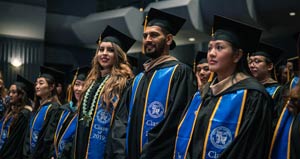Bachelor of Art in Education Areas of Concentration
Coding for Education
The Bachelor of Arts in Education with a concentration in Coding for Education bridges a path for students who want to pursue careers in the growing and exciting field of web development. The program focuses on creating dynamic and interactive experiences through a rigorous full stack coding curriculum. Students pursuing this program will gain the necessary skills for front-end and back-end development, all while preparing them for success in the professional world.
To complete a Bachelor of Arts in Education in Teaching English to Speakers of Other Languages (TESOL), students must complete the five (5) courses listed below—15 credit hours total.
| WEB 401 Front End Web Development |
6 credit hours |
| WEB 402 Back End Web Development |
6 credit hours |
| WEB 403 Advanced Full Stack Web Development |
6 credit hours |
Teaching English to Speakers of Other Languages (TESOL)
The Bachelor of Arts in Education with a concentration in Teaching English to Speakers of Other Languages (TESOL) provides students with an innovative methodology for English pedagogy with proven success at English language schools worldwide. Whether teaching in an ESL or EFL setting, students are prepared to deliver engaging and interactive language classes, while discussing the latest research trends in the English language teaching field. Students analyze, reflect, and integrate the foundations of TESOL and language acquisition into their teaching practices.
To complete a Bachelor of Arts in Education for Teaching English to Speakers of Other Languages (TESOL), students must complete the five (5) courses listed below—15 credit hours total.
| EDU 431 Foundations of TESOL and Second Language Acquisition |
3 credit hours |
| EDU 432 Lesson Planning and Classroom Management |
3 credit hours |
| EDU 433 Teaching Vocabulary and Grammar |
3 credit hours |
| EDU 434 Teaching Receptive Skills: Listening and Reading |
3 credit hours |
| EDU 435 Teaching Productive Skills: Speaking, Pronunciation, and Writing |
3 credit hours |
Early Childhood Education (ECE) - Administration
The Bachelor of Arts in Education with a concentration in Early Childhood Administration prepares students to be leaders in the field of Early Childhood Education. Students work, research, and learn from early childhood education teachers with diverse backgrounds and real-world experience. This certificate meets the State of California Community Care Licensing Title 22 Administrative Requirements to be a fully qualified director for a Title 22 (private) childcare (infant toddler, preschool, and school age) program as well as
Education (ECE) - the Title 5 Administrative Requirements needed to apply for a Child Development Master Teacher/Site Supervisor/Program Director permit for a Title 5 (public) childcare (infant toddler, preschool, and school age) program.
To complete a Bachelor of Arts in Education with a concentration in Early Childhood Education (ECE) – Administration, students must complete the five (5) courses listed below—15 credit hours total.
| EDU 451 ECE Administration I – Programs |
3 credit hours |
| EDU 452 ECE Administration II - Leadership and Supervision |
3 credit hours |
| EDU 453 Adult Supervision and Mentoring |
3 credit hours |
| EDU 454 Professionalism |
3 credit hours |
| Integrative Studies (General Education) Elective |
3 credit hours |
Early Childhood Education (ECE) - Teaching Preparation
The Bachelor of Arts in Education with a concentration in Early Childhood Teaching Preparation prepares students to be educators in the field of Early Childhood Education. Students consider, research, and learn to teach children with diverse backgrounds and ability levels. Students create a professional portfolio, partake in mock interviews, and are connected to leading Early Childhood Education agencies in the area. The certificate meets State of California Community Care Licensing Title 22 requirements to be a fully qualified teacher for a Title 22 (private) childcare (preschool, and school age) program.
Education (ECE) - To complete a Bachelor of Arts in Education with a concentration in Early Childhood Education (ECE) – Teaching Preparation, students must complete the five (5) courses listed below—15 credit hours total.
| EDU 441 Child Growth and Development |
3 credit hours |
| EDU 442 Child, Family, and Community |
3 credit hours |
| EDU 443 Principles and Practices of ECE |
3 credit hours |
| EDU 444 Introduction to Curriculum |
3 credit hours |
| Integrative Studies (General Education) Elective |
3 credit hours |
Education Technology (EdTech) - The Bachelor of Arts in Education with a concentration in Educational Technology (EdTech) examines the history, current practices, and future possibilities of integrating technology into classrooms. Students learn how to navigate and best engage their students in online and blended educational settings. By discussing the latest trends in EdTech research, learning theories, and practical hands-on experience, students analyze the ways in which technology can enhance the learning experience. This certificate enables pre-service and in-service teachers to design and develop an online/blended learning experience. Students enrolled in this program complete the following courses.
To complete a Bachelor of Arts in Education with a concentration in Educational Technology (EdTech), students must complete the five (5) courses listed below—15 credit hours total.
| EDU 421 Foundations of Educational Technology |
3 credit hours |
| EDU 422 Best Practices in Educational Technology |
3 credit hours |
| EDU 423 Online Assessment and Evaluation |
3 credit hours |
| EDU 424 Adaptive Technology for Differentiated Instruction |
3 credit hours |
| EDU 425 Blended Learning and Teaching |
3 credit hours |









